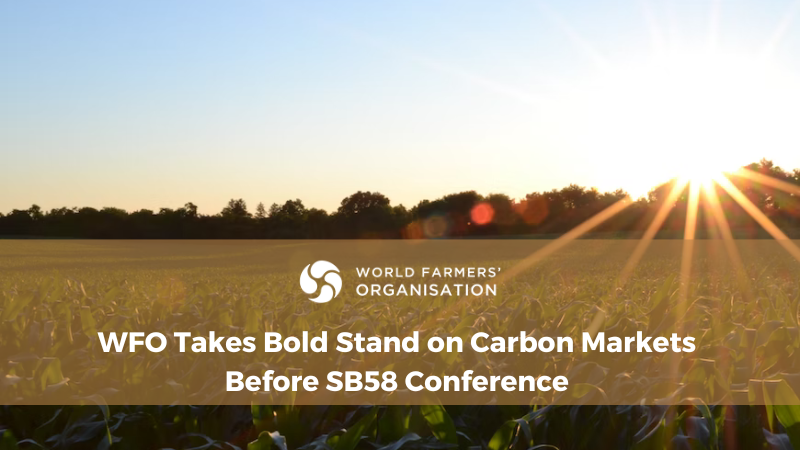The World Farmers’ Organisation (WFO) recently adopted an official position paper on carbon markets, approved by its General Assembly on May 22, 2023.
This statement, highlighting the organization’s commitment to advocating for sustainable farming practices that contribute to mitigating climate change, comes ahead of the ongoing Bonn Climate Change Conference (SB 58), where a crucial topic of discussion will be the implementation of Article 6 of the Paris Agreement on using carbon markets as a method for parties to achieve their emissions reduction targets.
WFO’s official statement builds on its seven recommendations proposed in 2019, which underline the potential for the agricultural sector to sequester carbon and offset emissions from other sectors. They also identify voluntary carbon offsetting schemes as potential instruments to reward farmers for carbon-storing practices.
Several voluntary carbon markets have emerged since 2019, but unfortunately, the focus has primarily been on the interests of carbon credit buyers instead of the farming community. With its recent statement, WFO aims to restore balance, minimise uncertainties for farmers, and establish clear guidelines for their involvement in carbon markets.
The design of carbon markets should be consistent with the Paris Agreement, which recognised “the fundamental priority of safeguarding food security and ending hunger” and aims to strengthen the global response to climate change “in a manner that does not threaten food production”. This is critical in ensuring that humanity achieves all Sustainable Development Goals.
Carbon markets represent an opportunity to incentivise climate action while directly supporting farmers’ and rural communities’ more comprehensive social, economic, environmental, and cultural aspirations. Carbon markets also come with the risk that productive farms and rural regions become a cheap means for other sectors to offset emissions and avoid the need to change behaviour.
To ensure that opportunities are maximised, and risks minimised, it is critical that carbon markets put the needs of farmers, the agriculture sector, and rural communities at the heart of policy design.
The WFO position paper sets out high-level principles to ensure carbon markets benefit farmers effectively, focusing on three key areas: Market Rules, Market Access, and Market Risk and Reward. These principles emphasize the need for public policy support, transparent rules and standards, and fair compensation for farmers’ carbon reduction efforts.
Market Rules:
The paper emphasises that carbon markets must complement food, energy, fibre, and ornamental production. It stresses the need for public policy support, transparent rules and standards, and the acknowledgement of farmers’ carbon reduction efforts.
Market Access:
Markets should be accessible to all farmers, no matter the size of their farm or who owns the land. The role of farmers in carbon sequestration should be recognised. The range of carbon sequestration methods, both above and below ground, should also be included in these markets.
Market Risk and Reward:
Farmers should be fairly rewarded for their greenhouse gas (GHG) mitigation efforts. Regulations should enhance rural communities’ socio-economic well-being, and capacity-building initiatives should be in place, especially in developing countries, to increase understanding of these markets.
As the Bonn Climate Change Conference (SB 58) progresses, the World Farmers’ Organisation invites all stakeholders to join their efforts towards advancing a carbon-neutral agricultural sector that benefit everyone.
